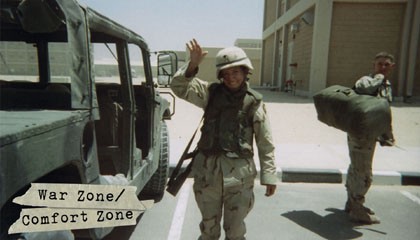Making a movie is like walking across a tightrope. It requires balance, will and muscles you never even knew you had. I’ve spent the last few years making a documentary about homeless women veterans. For some of these women, surviving life after the armed services is a sequel to fighting a war. War Zone/Comfort Zone airs Monday, March 10th on the PBS WORLD Channel at 8pm and 10pm. Find your local station here.
War Zone/Comfort Zone is about two women who open the first transitional, supportive house for women veterans in the state of Connecticut. The movie follows them as they fight through years of community opposition to create something that will transform the lives of women veterans who have struggled financially or even live on the streets. It also follows women who are homeless or on the verge of homelessness.
A very large percentage of the women are homeless are survivors of Military Sexual Trauma. I first read about the experiences of women who had been sexually assaulted while serving in the military in 2005, when I was just a junior in college. The horror and injustice stuck with me.
Becoming a producer meant realizing I had the power to tell the stories that I knew were important. Then, standing in an edit suite one day, I experienced one of those telescopic moments where time collapses. I can’t even remember what triggered it, but suddenly I wondered why I was hearing so much about male veterans, particularly homeless male veterans, and so little about women veterans and basically nothing about homeless women veterans.
The very next day I ended up going to a local zoning board meeting in the small city of Bridgeport, Connecticut. A surprise for everyone, hundreds of people were passionately arguing for and against the rezoning of a single family house for use by women veterans. It went on for hours and ended after midnight. Nearly every month for over a year, I sat on the same bench in City Hall, eating Twizzlers to stay awake while the proceedings crawled toward what was always the final item on the agenda: the highly contested house for women vets.
One thing I heard about over and over again from veterans was how their homelessness and trauma altered their sense of time. How day and night meld. How sleeplessness exacerbates PTSD. How a kind of nagging exhaustion takes over everything. In the movie, Inez a woman who criss-crossed Iraq driving a truck and scanning for IEDs (Improvised Explosive Devices), says, “You’re not just homeless at night. You’re also homeless during the day.” She would wrap herself in a sheet when she slept in the backseat of her car so people going to work would “think she was laundry.”
There isn’t a lot of data about homeless women veterans. What is known is that the number has greatly increased over the last few years, as the number of homeless male veterans has dropped. Women are dealing with a tangled web of issues, from Post-Traumatic Stress Disorder from Military Sexual Trauma and combat to employment issues, legal issues, family issues. All the while, they’re forced to climb the bureaucratic staircases that come with filing for much-needed benefits, usually at the VA that’s largely unequipped or unwilling to provide adequate gender-specific services. Not to mention that many, many women veterans are raising children in the process.
Now, this issue is starting to scratch the surface, but it still feels like progress is not keeping pace with women’s needs. For a while, it looked like Senator Kirsten Gillibrand’s bill to take investigations into military sexual assault out of the chain of command could pass. But even though it had a majority of the Senate and bipartisan support, it didn’t meet the 60-vote threshold to stop a filibuster, and the bill failed. A different bill that keeps the decision within the chain of command, backed by Senator Claire McCaskill, is likely to pass.
When I read news about women soldiers and veterans, I feel a little disjointed myself. Just last week, another top officer responsible for prosecuting sexual harassment for the Department of Defense was suspending for alleged sexual harassment. Reading that headline feels like deja vu.
I finished this movie in 2011. I read that first article that got me thinking back in 2005. And now, in 2014, Military Sexual Trauma is at least is on the map especially thanks to the Academy Award nominated film The Invisible War.
What the women in Bridgeport, CT did was create a local solution for a sprawling problem, yet on the issue of homeless women veterans, we’re far from a national discussion. All I can do is elevate their stories and contribute to a growing dialogue that recognizes the sacrifice and courage these women have shown. At the end of the day we all need to ask: how long do homeless women veterans have to wait for us to make their lives a priority?
___________________________
Lizzie Warren in a filmmaker and writer living in Brooklyn. She is currently working on a new project organizing among low-wage workers.







